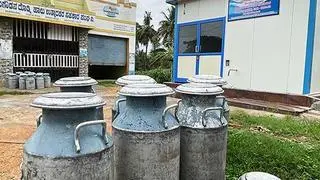The Centre has banned wheat exports citing food security and rising domestic inflation as its prime concern amid a forecast of a lower crop in major producing countries of the world. The decision came a day after it announced a promotional visit by a delegation to nine countries to boost wheat export.
Simultaneously, the Food Ministry has reduced 56 lakh tonnes of wheat quota for some States under the National Food Security Act and reallotted rice instead of it to ensure increased availability in Central Pool stock.
In a notification issued late on Friday night, the Centre, through the Directorate-General of Foreign Trade, justified its decision saying there has been a sudden spike in prices of wheat “arising out of many factors” as a result of which the “food security of India, neighbouring and other countries are at risk”.
“The price rise in some parts of the country is as high as 38-40 per cent. One primary goal is to put a check on food inflation. Besides ensuring food security of the country, the government is committed to actually ensuring the food security of neighbours and vulnerable countries,” said Commerce Secretary BVR Subrahmanyam. He said out of the over 7 million tonnes (mt) of wheat exported last fiscal, half of it went to neighbouring Bangladesh.
“In the notification issued by DGFT, we have kept the window open for neighbours and a large number of vulenerable countries if their governments make a request. In the name of prohibition, we are directing the wheat trade in a certain direction. We do not want wheat to go in a unregulated manner to places where it may just get either hoarded or it may not be used for the purpose,” Subrahmanyam said.
Though the trade will be private (not to be supplied from government stock), the other entity requesting for wheat must be a government entity in the importing nation, he said.
The government estimate is that about 4.3 mt have been contracted so far, out of which 1.2 mt has been shipped in April and another 1.1 mt may go in May. If exporters have valid order and an irrevocable letter of credit, that contract will be honoured, he said, adding totally 4 mt may go out of the contracted volume.
He said if the estimates are revised upwards in future and food and agriculture ministries are comfortable with the grain’s availability, export could be resumed. “No order is in perpetuity,” he said, referring to the May 13 order of the Commerce Ministry.
Relief to growers
This should provide some relief to wheat growers, who are worried over the export ban. They fear that the ban could result in prices dropping below current levels of about ₹2,200 a quintal and even lower than the minimum support price of ₹2,015.
Briefing media on the wheat situation, Food Secretary Sudhanshu Pandey said availability is not a problem, but the “unregulated trade” is pushing prices up. The information about lower production in different countries is leading to speculative trading.
Pandey also said the procurement by the Food Corporation of India (FCI) could be about 18.5 mt this year against the previous estimate of 19.5 mt, which itself was reduced from the initial 44 mt. The procurement so far is 18 mt, he said. On the heels of reallocating 5.5 mt of rice in place of wheat under PMGKAY for some States, the government also decided to reallocate another 5.6 mt under NFSA, he said, adding this would ensure 11.1 mt of additional availability with the FCI.
Yield, output down
Amid speculation that the country’s wheat production has declined to 95-98 mt this year from 109 mt last year, Agriculture Secretary Manoj Ahuja said the output could be 105-106 mt. Wheat production was initially estimated at a record 111.32 mt before it was revised to 105 mt after the crop was affected by the heatwave in March and April.
The crop was in the grain-filling stage when the heatwave struck and this affected the yield. The extreme heat led to shrivelling of the grain, resulting in 15-20 per cent drop in productivity in most wheat-growing States.
The Centre would send trade delegations to Morocco, Tunisia, Indonesia, the Philippines, Thailand, Vietnam, Turkey, Algeria and Lebanon for exploring possibilities of boosting wheat exports from India, the Commerce Ministry had said on May 12. Though an official statement on the same day had said the country has set a target of a record 10 mt of wheat in 2022-23 amid rising global demand for the grain, Subrahmanyam on Saturday claimed that it was “an aspiration not target.”









Comments
Comments have to be in English, and in full sentences. They cannot be abusive or personal. Please abide by our community guidelines for posting your comments.
We have migrated to a new commenting platform. If you are already a registered user of TheHindu Businessline and logged in, you may continue to engage with our articles. If you do not have an account please register and login to post comments. Users can access their older comments by logging into their accounts on Vuukle.